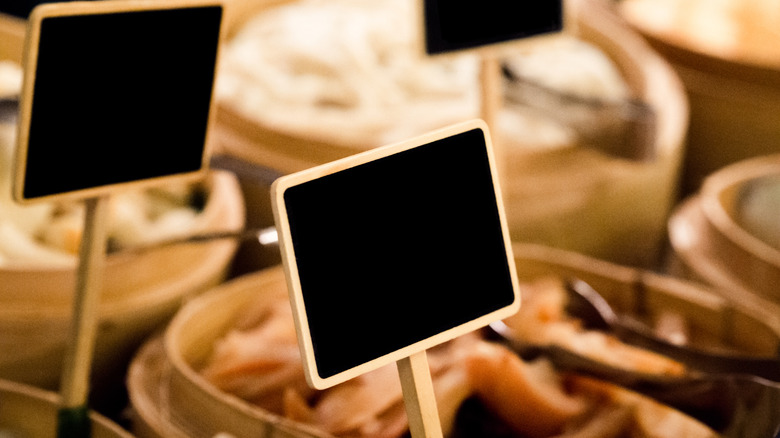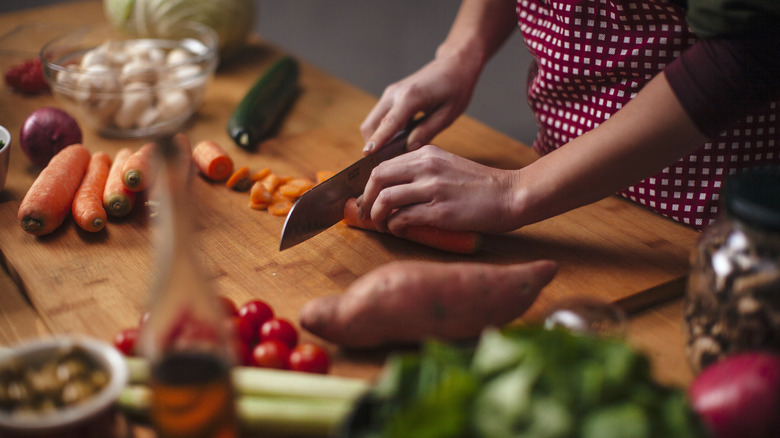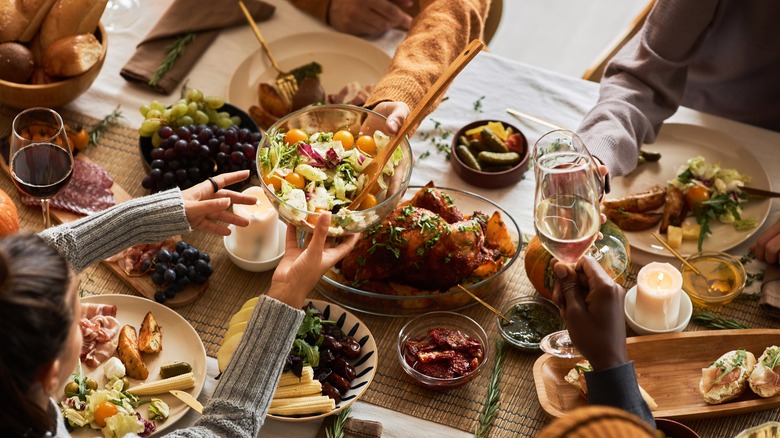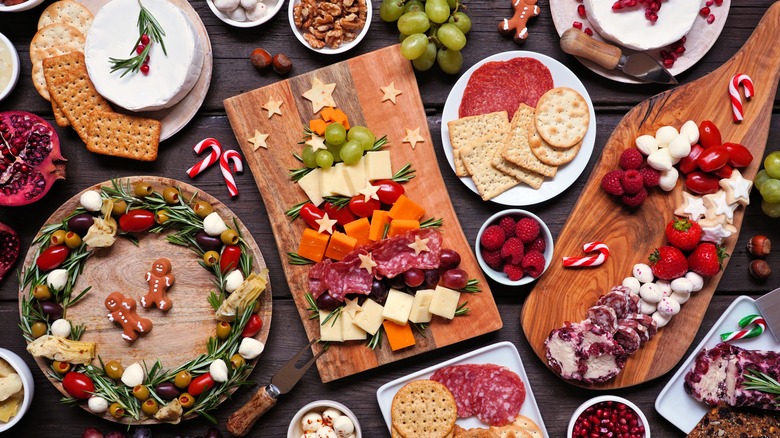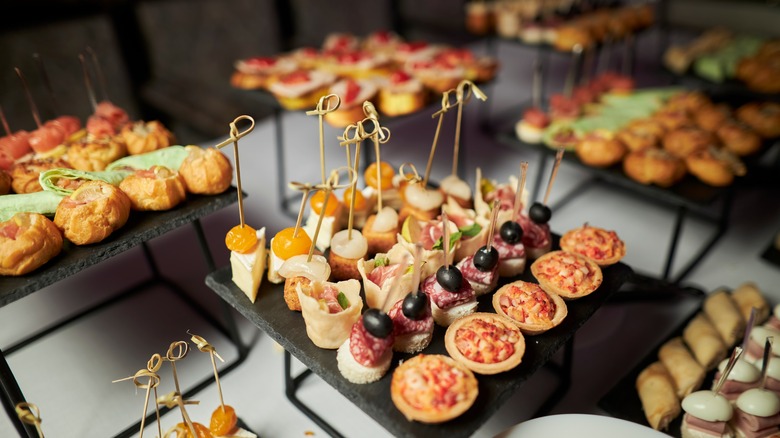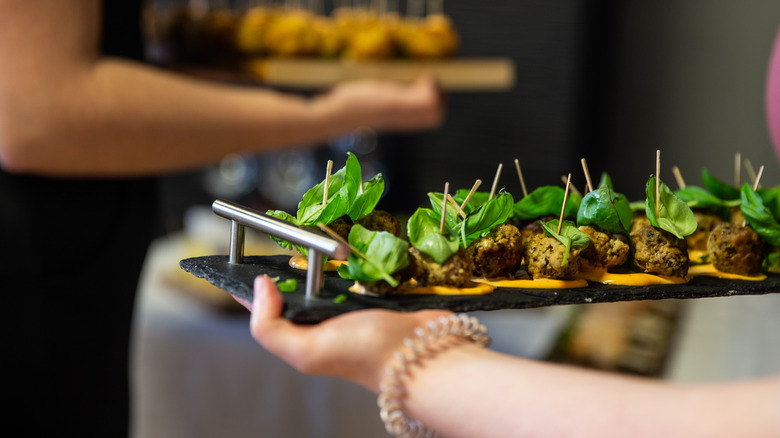13 Holiday Hosting Mistakes That Could Ruin Your Gathering
It's the most wonderful time of the year, a time for sparkly party dresses, clinking glasses, indulging in some of our favorite foods, and gathering loved ones. Equally, it can also be the most stressful.
For those hosting a get-together this year, your brain might be in overdrive, counting the number of ways it could all go wrong. We're here to tell you that almost all your worries can be easily avoided with just a little advance thought and preparation. While we can't prevent your grandma from sticking her foot in her mouth again, your young nephew from picking his nose or airing the family secrets, or your boss from trying to talk shop during your soiree, we can advise on a lot of stumbling blocks.
We recommend giving this list of possible hosting mistakes a quick read-through, as it's peppered with numerous easy, accessible solutions to many of your hosting worries, from removing awkward lingering guests to preventing potentially dangerous health risks. It's all designed to take you fearlessly into this season of celebrating, helping you squeeze as much joy as possible out of your hosted event.
Not checking with guests on allergies or eating restrictions
Holidays can bring on enough stress to make anyone's brain turn upside down. Even just thinking about the to-do lists might send pulses racing with the surge of stress. While the increased levels of activities and holiday chaos sometimes make us forget pretty basic things, failing to check with party guests regarding food allergies or restrictions may not only put a wrinkle in your get-together, it could be pretty dangerous and even life-threatening, which is why it's number one on this list.
Whether by choice, for religious purposes, or due to health concerns, there are many valid reasons to check in with guests before serving a meal. Food allergies have been on the rise for the last few years, both in children and adults, with no signs of decreasing anytime soon. Allergies can range from gluten to dairy, seafood, tree nuts, egg, or sesame. For sit-down dinners or parties where the host does all of the catering, it's a relatively simple task to touch base with guests to ensure all of the ingredients you're serving are safe for their consumption. It does become a bit more complicated for potlucks and cookie exchanges, so make sure to convey your concerns or any allergies to your guests planning to bring food to keep everyone safe, healthy, and well-fed this holiday season.
Offering only alcoholic drinks
The holidays are the perfect occasion to drink all the drinks. But you're missing a trick if you're only serving the boozy kind. Zero-proof alcohols, spirits, beers, and alternative beverages are finally having their moment in the sun, and taking advantage of what's on offer isn't just delicious; it's also necessary for any gracious host.
Guests may opt out of alcohol for a variety of reasons, from driving or family responsibilities to health concerns, many of which can be pretty personal. It can be a massive relief for those who aren't drinking to find themselves with several non-alcoholic drink options freely available, especially if offered readily, without the need for them to disclose their reasoning or feel like they're being a huge bother by prompting hosts to serve special non-alcoholic options. With so many delicious shrubs, seltzers, and non-alcoholic spirits on the market, you'd be remiss not to pick up a few for all of your hosting needs this season.
Overcomplicating the menu
Too many cooks spoil the broth but equally so can one cook with too many big ideas or over-the-top lists of ingredients. When it comes to extensive holiday entertaining, doing less can often mean more time spent soaking up the company of the people you care about rather than stressing and sweating in the kitchen. It may also reduce the chances of things going wrong.
This could play out in several ways, You might serve less variety of appetizers but more of each kind. Or it could translate to one or two show-stopping centerpiece dishes on the table (think one meat and one vegetarian) rather than three or four. Are there items you might make beforehand or purchase from the local bakery, deli, or grocery store? Great! Do that. Do you have a delicious holiday dish you know so well you could practically make it in your sleep? Choose that over the siren calls of a tempting dish you've never attempted. Save that new dish for a low-stakes moment rather than the high-stress environment that inevitably commences two hours before your holiday party kicks off. Your blood pressure will thank you.
Leaving foods unlabeled at a buffet or potluck
There are many reasons to label all the foods and dishes at your next potluck or buffet this holiday season. First, it can help create a sense of familiarity, comfort, and ease for your guests. Labeling dishes can encourage guests to try new foods. In potluck situations, it can also help share meaningful cultural traditions and customary dishes simply by providing guests with information, which stokes feelings of warmth, belonging, and community.
Labeling foods and including the ingredients used within dishes also increases the visibility of any possible allergens contained in the dishes. This simple act not only protects the health of those with food allergies but also goes a long way to remove or at least reduce the anxiety many people with food allergies have when it comes to trying new foods.
And, everything else aside, labeling foods, whether at a cookie exchange or even a buffet, serves as a shared talking point for guests who may be struggling to make conversation— from discussing what goes into their version of the same dish to pondering the origins of a particular spice, or likening the dish to another they've tried from the region.
Not giving yourself enough preparation time
Though optimism is a welcome trait on most occasions, it can be a host's downfall when used in party planning scenarios. Inevitably, everything from recipes to shopping to cleaning the house will take more time than you anticipate. When you multi-task, things will take even that much longer, which can also feel inevitable when it comes to party planning.
Whether you're serving dinner from start to finish or light bites and appetizers, there are always elements that can and should be readied in advance, from dips to dishes done in stages or served cold.
For instance, peppermint bark and old-fashioned peanut butter fudge make a fantastic light end to a meal or work well as a party favor. Not only are they simple to prepare, but they will also hold up for several days in advance. Are you trying something a bit more extravagant? Cheesecake is also better made well in advance. Making it from scratch can be quite a fiddly and time-consuming process and, just like a party host, needs some solid chilling time before it's at its best.
Making dishes challenging to share or pass
While we might imagine a holiday table heaving to practically buckling with platters of food, figuring out how to get those platters passed around and guests served is an entirely different story. Consider, too, the space guests have at the table to put their own plates and a little elbow room. After all, no one wants to risk knocking out their dinner companion simply by raising their fork and knife to cut up their food.
When planning your meal, it might help to consider using a sideboard or fold-out side table for placing serving dishes when not being passed around the table. Pre-slicing loaves of crusty bread, jointing chickens, and using two more reasonably sized serving dishes at either end of the table rather than one giant one are all great ways to make it easier for food to reach your guests.
Equally, to help reduce the number of serving dishes on the table, a layering technique may help guests reach everything they want in a single move. Topping platters of starches like pasta and rice with roasted vegetables or well-arranged pieces of chicken and mashed potatoes with gravy and slices of pot roast allows guests to achieve a plateful in just one or two scoops, leaving more room on the table and taking up less time to pass the peas.
Underestimating the needs of young children
The holiday season can bring out the best and the worst in people, even adults. The socializing, over-excitement, and gift-giving and receiving pressures can throw anyone for a loop, no matter what age. It can also be easy to underestimate the needs of children in these scenarios, especially when many parties tend to revolve around adults and older family members or parents needed in the kitchen, hands busy with preparations.
The bottom line is, no matter what kind of party you're throwing, if kids are invited, you'll all have a better experience if there are some dedicated activities for them. This could look like a table just for cookie decorating at your holiday cook swap. It might mean making sure plenty of crayons and paper are set out at the table, or better yet, in a separate space if available, when hosting a sit-down dinner. It could mean putting on an age-appropriate movie, throwing a bunch of pillows and blankets on the floor, and popping some popcorn if you're hosting a drinks and nibbles party. You can even rope kids into tasks like setting the table, offering napkins or canapés, or talking with people who seem unsure. Whatever you do, ensuring the youngest party guests are happy can go a long way towards overall party success.
Overestimating the ability of your guests to make small talk
Many holiday parties involve a clash of various worlds, whether that's work colleagues, family, childhood friends, or the parents from your kid's playgroup. Mixing and mingling can be exhausting!
There are as many kinds of partygoers as varieties in a box of chocolates. And, like Forrest Gump's mama says, "You never know what you're going to get"... seated next to you. That is precisely why you should consider all guests in an attempt to find some commonalities. Ina Garten goes as far as to suggest laying out a seating plan that takes into account extroverts and listening skills, strategically placing the most gregarious people in the very center, then sprinkling the best listeners and conversationalists, known as "middlers," around the table to keep the conversation lively.
If you're hosting a drinks and nibbles party rather than a sit-down affair, ease conversation starters with thoughtful introductions. There's also nothing wrong with setting up a name tag station, where folks write their first names and an interest, pet, favorite holiday food, or some other simple conversation starter to break the ice and get the chit-chat flowing.
Underestimating how much food you will need
Grandma got it right: too much food is better than not enough. This is especially true in social situations like parties. Though it helps to be very clear in your invitations whether or not the party includes partners, children, or plus-ones, occasionally miscommunications happen, which could mean the appearance of an extra guest or two you did not expect.
Planning to have extra doesn't mean the food needs to be extra-complicated. This could be as simple as throwing in a few extra turkey legs and potatoes to roast, picking up an extra wedge of cheese and a box of crackers, or buying a few more packs of pre-cut veggies at the grocery store. Prepping enough food to serve all confirmed guests plus a few extras is an excellent way of ensuring you won't run out, no matter how much people eat. In the back of your mind, plan what to do with leftovers, like making a soup or stew or freezing any additional items. Leftovers can also be a welcome treat the day after the night before, when energy levels are low, and the sofa's gravitational pull is high.
Forgetting about snacks
There's nothing quite like the purgatory of arriving ravenous to a holiday dinner party, only to be repeatedly told dinner was "coming" while the host frantically scampers about in the kitchen. Tedious for guests, unbelievably stress-inducing for hosts, and all easily avoidable with this one-word solution: snacks.
Snacks are a vital component of any good party. Whether you're looking to soak up a bit of alcohol from the holiday-themed gin and tonics and keep the party from getting too rowdy too soon or extend the patience of guests young and old while you put the finishing touches on dinner, make sure to include a few nibbles in your party plans.
It can also be helpful to have snacking bowls or trays scattered throughout the party to avoid clusters of people and bottlenecking, helping to keep people fed and happy and spreading out the crowds for optimal flow, comfort, and ease. We're essentially all animals, led to follow wherever you'd like us to go with the promise or smells of something delicious to eat.
Not delegating your needs
Delegating or actively communicating our needs can feel difficult even on a regular Tuesday, let alone during the holiday season. And, while list-making and pre-planning are great strategies to deal with planning overwhelm, there is nothing wrong with bringing in an additional task force to help you. We highly recommend doing just that.
Whether this looks like creating a to-do list with your partner, only to divide and conquer, or assigning tasks to party guests, people genuinely want to pitch in. Ask guests to bring dessert, wine, or bread to the party. Choose a few close friends and ask them to arrive early to join you in setting up, then reward and thank them with the evening's first pour of wine or spirits or the first pass of canapés. Use wine glasses (or even biodegradable products) so you don't have to wash them or worry about breakages. If you can, hire cleaners to come before or after the party and build their fee into the party's cost. Planning ahead with your budget to save time, energy, and mental load is often worth every penny.
Not thinking about the flow of food or foot traffic during your event
Planning a good party from start to finish is much like assembling a good playlist. You want to start with something familiar that gently warms up the crowd, then deliver the main event, and slowly but distinctively draws things to a close on a high note. You don't want to peak too soon (and have full and bored guests) or delay things too long and leave the crowd hungry and restless.
Consider kicking off the party with a signature cocktail, including a non-alcoholic version. Next, add a nibble of something, either a few stationary options that are well-placed around the space or a passed canapé or appetizer. This will ensure the crowd spreads out and remains jovial.
Then, depending on the size of your gathering, encourage guests to join in the cooking process, keep you company in the kitchen, or continue entertaining themselves with food and drink while you finish up. Whether this is a sit-down dinner or simply a pass of hot appetizers, your presence as host will be necessary and appreciated at this time. After all, guests are here to see you.
The finish of your party performance might come in the form of desserts, possibly a cheeseboard, and a wind-down drink, whether this is a liquor or a mug of herbal tea.
Being too vague about starting or ending times
It feels like a universal truth that for every party guest who shows up on time and leaves when they should, there will always be one exception to the rule that throws hosts for a loop with a very early arrival or lingering long after the party has ended. Therefore, putting everything we can in place to reduce the likelihood of this inevitable annoyance is worth its weight in gold.
It can be helpful to communicate a window when you'd like guests to arrive, letting them know what time you plan to serve the main meal and when "carriages" are expected. The term "carriages" is a slightly old-fashioned but beneficial term used to inform guests of what time the party ends. Adding an ending time is a good way of letting guests know in advance when you plan to call the party to a close. So, when you start to tidy up the house or clear away glasses, most won't need any more hints to begin saying their goodbyes.




